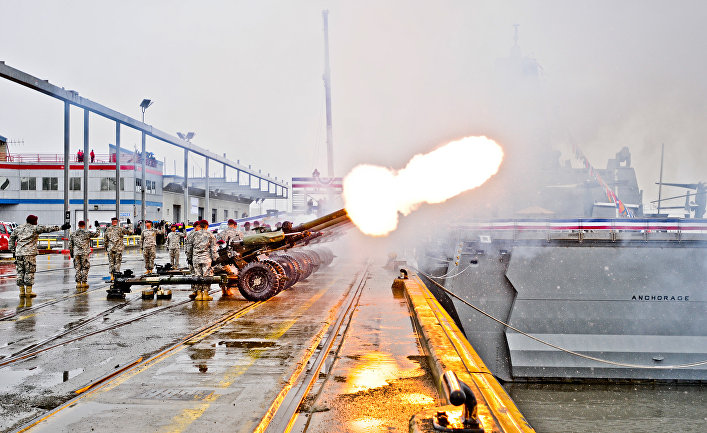First, Iran and P5+1 powers seal a nuclear agreement. Second, Europe and Greece compromise. The EU and IMF take control of Greece in return for 86 billion euros. Third, Turkey and the US reach some kind of agreement on Syria. Following speculations about Turkey playing the 'safe zone' card, military intervention inside Syria is off the agenda after the visit of a high profile American delegation to Ankara. What this means in the future, is unclear. Meanwhile Iran, Turkey, and Greece have been turned into 'obstacles.' An important question to ask is, what are these 'obstacles' to?
Only a few people know who General Joe Dunford is, but if he gets appointed as 'Joint Chiefs of Staff Chairman', we will hear that name more often. One way for General Dunford to get the nomination was to explain his perception of the world and the army before the US Senate Committee on Armed Services. Those were the statements as to what poses the most critical threat to the US: "If you want to talk about a nation that could pose an existential threat to the United States, I would have to point to Russia. Russia presents the greatest threat to our national security. And if you look at their behavior, it's nothing short of alarming." ('Incoming Joint Chiefs chairman calls Russia, China top threats', 09/07, Military Times.) In a recent article, I pose a question: Which is stronger: China or Russia? The answer remains Russia. One should never forget what it means to the 'balance of world powers.'
The media does this often: While 'attracted by the reader', journalists sort out the 'distinctive part', meanwhile omitting the rest of Dunford's speech: “What keeps me up at night is our ability to respond to the unexpected. On balance, our force can deal with the challenges that we have now. But there is very little residual capability.” What it actually means: Give us more arms, more soldiers and more money.
Cyber Armageddon
There is another important point. Everyday we are reading that there are countless threats to the US, but we forget that American officials themselves declare new and top threats. For instance, James Clapper Director of National Intelligence told the Congress in February that the very first threat facing the country is 'cyber-attacks.' "Cyber threats to U.S. national and economic security are increasing in frequency, scale, sophistication and severity of impact; [and] the ranges of cyber threat actors, methods of attack, targeted systems and victims are also expanding. Cyber ranks highest on worldwide threats to U.S." ('James Clapper, intel chief: Cyber ranks highest on worldwide threats to US', 26/02, The Washington Times.)
If we surrender ourselves to the American officials' lift of threats and countries which feed them, one should think Turkey as a heaven. Russia, China, North Korea, and cyber wars may be removed from the list in the near future, but groups like Iran, ISIS and Al Qaeda remain to be a threat to the US, but it just so happens that many of them or their branches are on the border with Turkey.
War Can't Stop War
Since the level of US's threat perception is far higher than other countries', even outer space is a threat. The US has not only global but also universal panic attacks, as they themselves created these threats and nourished them. American national security wheel controls the biggest military mechanism in the world and it is based on stopping 'all the potential threats.' This creates the biggest war industry of all. "The army needs to be always ready, updated and improved so that it would respond to the attacks which can come in unexpected and countless alternatives immediately and in the same way." This assessment is delivered by the armies and defense firms to the leaders of the countries all the time. "We are depriving ourselves of that capability through ill-advised across-the-board budget cuts that will reduce defense spending by roughly a trillion dollars over the course of this decade. Those cuts are already beginning to bite, with the army announcing that it is laying off 40,000 troops to shrink to 450,000 active-duty personnel, its lowest level since 1940. Gen.
Ray Odierno, the Army Chief of Staff, has just warned that his service can’t get any smaller and still meet its obligations, but it is likely to shrink to just 420,000 personnel unless sequestration is repealed. The Air Force, meanwhile, is down to 315,000 personnel, its lowest level since the service’s creation in 1947. And the Navy, which needs to have well over 300 ships to meet existing requirements, has only 273 ships deployable at the moment." ('What Is the Greatest Threat to US National Security?', 12/07, The Commentary.)
Defense firms are always complaining. However, the US's 'naval forces' have 3700 operational war planes. This is an unprecedented force and it is not only unique but also balances many superpowers in terms of combined military force. In other words, American army has to 'produce ammunition' adequate to support American weapon and defense industry. What is more important is that the army has to 'consume' it.
How about making a threats list for Turkey as well? We have to include our neighbors, the elements inside them, our internal threats and seas, not to mention secondary and tertiary peoples, who all pose primary risk. Are those threats inferior to the fears of the United States?






